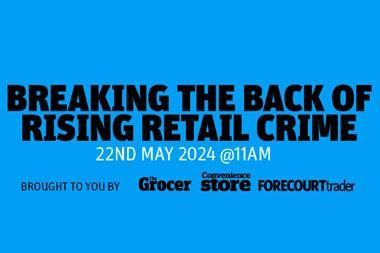Retail crime is on the rise. With violent attacks on store owners and their staff increasing, the need to protect retail workers is becoming ever more urgent. And while in-store security devices go some way towards this, retailers also need to start working together to combat crime in their areas.
Association of Convenience Stores chief executive James Lowman says that if businesses work together tackling crime gets easier. “The convenience sector has become more of a target for crime in recent months, so it’s important that retailers work with each other to try to fight this,” says Lowman. “It’s unlikely that one singular retailer can do this on their own so they need to work with others.”
One retailer concerned about crime in his area decided to contact other businesses to fight the problem collectively. John Maxwell-Jones of Burgess Stores in Goudhurst, Kent, was influential in setting up a crimewatch scheme and worked with other retailers in his town and surrounding areas in attempt to better protect businesses.
He says: “Because we’re based in rural communities rather than big cities, it takes the police that bit longer to reach us. Even if it’s only a few minutes more it could mean the difference between life and death.”
Stores involved in the scheme keep in constant contact with each other via radios, and regular meetings allow information that is important to retailers to be passed between them.
If a retailer spotted something suspicious, they could let all the others know immediately and if necessary the police could be informed. “By keeping in touch like that we know what is going on and can better protect ourselves,” says John. “The scheme has worked well and the businesses involved don’t feel like they’re dealing with the problem in isolation.”
Lowman recommends that c-store retailers looking to work together in this way should first contact other businesses nearby. “Start off by getting in touch with other businesses in your area and the local police force,” he says. “Keep it simple at first and then let it build up when more people join.”
William Price of retail crime watchdog Action Against Business Crime suggests building a more pro-active relationship with the police via a Business Crime Reduction Partnership (BCRP).
“If several businesses come together and talk to the police or local authorities about their concerns over crime, there is a greater chance of them being heard,” he says.
“This can also be done by setting up a legal entity such as a BCRP. At the very least if numerous businesses from a single area approach their local police force, they will have to acknowledge that crime is a problem.”
Price points out that there is a significant difference between a crimewatch scheme and a crime partnership. “A crimewatch scheme involves sharing data between businesses, such as descriptions of suspicious individuals, but personal information such as names and addresses fall under the Data Protection Act and there are certain legal ramifications of passing this data on, so it’s better to do this through a partnership scheme.”
He adds: “A BCRP enables businesses to share information with each other and the police. The vast majority of business crime doesn’t get reported to the police because retailers feel it’s not worth it and criminals know this. They know the chances of getting prosecuted for theft are actually quite small and that the most that will happen is that they are banned from that particular store and able to steal from other shops.
“If the crime is reported through a partnership then there is the opportunity that if caught they will be banned from all stores in the partnership and charged with all of the offences reported, which acts as more of a deterrent,” he adds.
Price says it’s easy to set up a partnership and that all stores have to do is be willing to work together. “There are certain compliance protocols that have to be addressed, but Action Against Business Crime can help a group of businesses through this,” he says.
Price also advises anyone looking to set up a partnership to appoint a dedicated manager to run it. “Sometimes one of the store owners will volunteer to be manager and it’s fine at first, but then their everyday business takes away from the running of the partnership,” he says. “It’s much better to have a full or part-time manager who is funded through membership fees and who can give it their full concentration.”
Creating a business crime partnership can also free up local officers from paperwork and save the police force money, which helps build stronger relationships with the police. The Brighton & Hove Business Crime Partnership recently announced that it has saved Sussex Police almost £4m over the past two years thanks to its incident reporting system.
The partnership’s business crime manager Nigel Lidell explains how the money was saved. “To report a crime to the police costs the force more than £1,000 in man hours and administration, no matter what the crime is,” he says. “Our new system gives retailers the opportunity to report an incident to us either online or by post. It is then recorded and sent to the police anti-social behaviour team, eliminating the need for officers to be called out to the store.
“It’s perfect for crimes which the retailer might feel don’t warrant an officer visiting,” he adds. “Ordinarily, the retailer would just bar the thief from the store and there would be no record of it leading to a perpetual cycle of low-level crime going unreported.”
Rob Dyson of Manchester City Centre BCRP says that taking a united stance will make the fight against retail crime easier, and creating or joining a BCRP is a great way of doing this. “We’ve managed to cut out a huge amount of crime in Manchester City Centre thanks to our partnership and working together,” he says.
Exclusive offer for Convenience Store readers
Convenience store owners are constantly looking for ways to better protect their businesses and one way of doing this is to conduct a risk assessment survey.
To help retailers, our Zero Tolerance coverage sponsor Loomis is offering a free risk assessment to readers of Convenience Store. “A risk assessment is an important step in protecting your business,” says Loomis risk director Tony Benson. “It helps you to focus on the risks that really matter those with the potential to cause significant harm to your business.”
He adds that even small changes such as repositioning CCTV systems can help retailers protect their stores. “Armed with the risk assessment, retailers can dramatically reduce the risks to people, property and profits through the implementation of simple, cheap and effective measures,” says Benson.
A survey will analyse all aspects of the running of the store, from cash management and staff procedures to proper placement of security measures. “It is recommended that a risk assessment be conducted annually, or whenever a change takes place in the store,” Benson says. “It can be surprising the extent to which even the slightest change in a process can totally invalidate the most robust and secure of sites.”
According to Loomis, cost is a major factor in stores not having regular risk assessment surveys. “Usually a risk assessment survey can cost anything from hundreds to thousands of pounds, depending on the scope and purpose of the survey,” says Benson. “However, we are delighted to offer a risk survey to store owners for absolutely no charge and with no obligation.”
The free Loomis risk survey is available exclusively to Convenience Store readers. To qualify, simply register with the Loomis Community at www.loomis.co.uk/freerisksurvey. For more information, call C-Store’s Aidan Fortune on 01293 610222.





















No comments yet